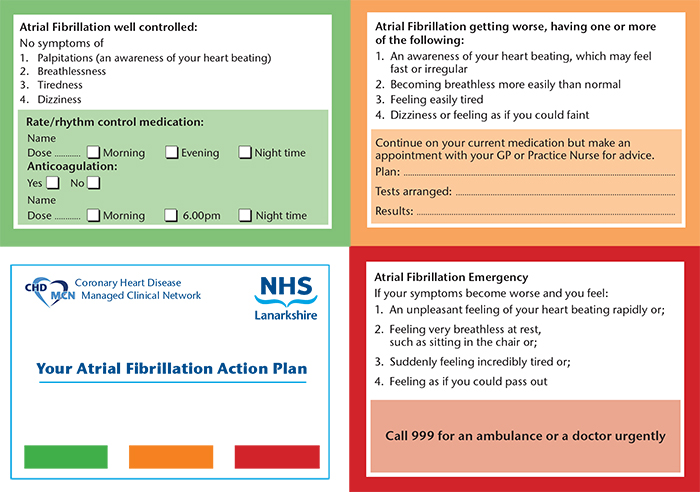Additional information is always useful for supporting patient self managment. Below is an atrial fibrillation self-management resource example from NHS Lanarkshire’s AF project:
Atrial Fibrillation well controlled:
No symptoms of
- Palpitations (an awareness of your heart beating)
- Breathlessness
- Tiredness
- Dizziness
Rate/rhythm control medication:
Name
Dose ……
Tick boxes for:
- Morning
- Evening
- Night time
Anticoagulation
Tick box for:
- yes/no
Name
Dose ……
Tick boxes for:
- Morning
- 6:00pm
- Night time
Atrial Fibrillation getting worse, having one or more of the following:
- An awareness of your heart beating, which may feel fast or irregular
- becoming breathless more easily than normal
- feeling easily tired
- dizziness or feeling as if you could faint
Continue on your current medication but make an appointment with your GP or Practice Nurse for advice.
Plan ……
Test arranged ……
Results ……
CHD/MCN Coronary Heart Disease Managed Clinical Network
Your Atrial Fibrillation Action Plan
NHS Lanarkshire
Atrial Fibrillation Emergency
If your symptoms become worse and you feel:
- An unpleasant feeling of your heart beating rapidly or;
- Feeling very breathless at rest, such as sitting in the chair or;
- Suddenly feeling incredibly tired or;
- Feeling as if you could pass out
Call 999 for an ambulance or a doctor urgently
Pulse point
You may find it useful to review the HEARTe introduction “Applying HEARTe in practice”: which relates to broad self management principles.
Useful Resources for yourself and for patient information and signposting:
Champions of Self Management in Care: COSMIC
The Scottish Government: Gaun Yersel – The Self Management Strategy for Long Term Conditons in Scotland
The Alliance: Health and Social Care Alliance Scotland
NHS Fife: How to take your own pulse
Pulse flyer (NHS Fife) A5
Page last reviewed: 30 Jul 2020


